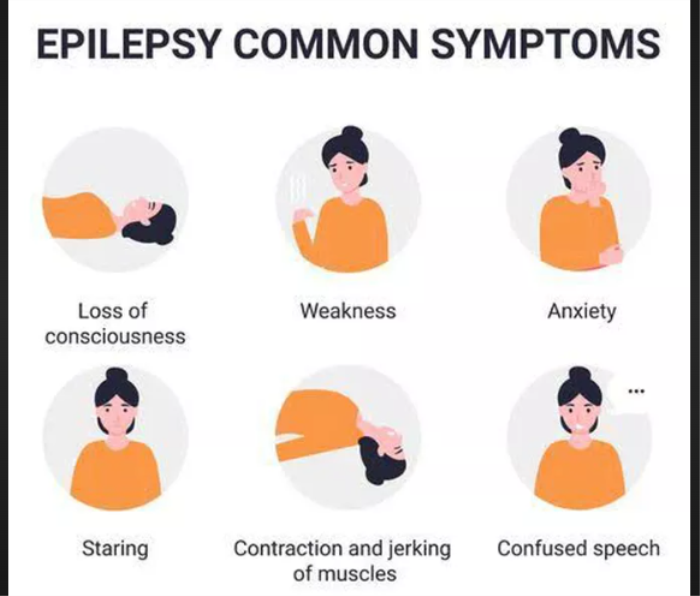Epilepsy is a neurological disorder characterized by recurrent seizures due to abnormal brain activity. Recognizing the early signs is crucial for timely diagnosis and treatment. While seizures are the hallmark of epilepsy, the symptoms can vary greatly depending on the type of seizure and the part of the brain affected. Early recognition can lead to better management, reducing the risk of complications. This blog explores the common symptoms of epilepsy, helping you understand and identify warning signs that may need immediate attention.
Medical disclaimer: This content is for general awareness and does not replace a doctor’s consultation. For diagnosis or treatment decisions, consult a qualified specialist.
Common Symptoms of Epilepsy: Recognizing the Signs Early
Epilepsy is a neurological disorder that affects the brain and causes recurring seizures. Recognizing the common symptoms early can help manage the condition effectively and prevent severe outcomes. Some of the initial signs include strange sensations, confusion, and loss of consciousness.

Seizure Aura: An Early Warning Sign of Impending Seizures
Seizure auras are subtle sensations or feelings experienced before the onset of a seizure. These can include visual disturbances, unusual smells, or feelings of deja vu. Recognizing a seizure aura allows for timely medical intervention.
Unexplained Confusion: A Key Symptom of Epileptic Seizures
Unexplained confusion may occur before, during, or after a seizure. It often involves disorientation, difficulty concentrating, and memory loss. This symptom is crucial in identifying and diagnosing epilepsy.
Abnormal Movements: Shaking or Jerking of Limbs
Seizures can lead to abnormal movements, such as jerking or shaking of the limbs, which may be generalized or focal. These movements, particularly if they occur without warning, are an important symptom of epilepsy.
Loss of Consciousness: A Critical Indicator of Seizures
Loss of consciousness during a seizure is a significant sign of epilepsy. It can occur suddenly, and the person may not be aware of their surroundings during the seizure episode.
Sudden Behavior Changes: Unexplained Aggression or Hyperactivity
Behavior changes like aggression or hyperactivity can signal a seizure in certain types of epilepsy. These changes can be observed in both children and adults.
Focal Seizures: Symptoms Depending on Brain Area Affected
Focal seizures are localized to one part of the brain, leading to symptoms such as altered sensations or movements. These seizures can cause varying symptoms based on the brain region affected.
Staring Episodes: A Potential Sign of Absence Seizures
Staring episodes may be indicative of absence seizures, where the individual appears to “zone out” temporarily. These seizures are more common in children.
Sensory Disruptions: Hearing, Smelling, or Seeing Things
Sensory disruptions such as hearing voices, smelling strange odors, or seeing things that aren’t there are early warning signs of epileptic seizures. These occur due to disturbances in the brain’s sensory processing regions.
Feeling Anxiety or Fear Without Reason
Anxiety and sudden feelings of fear can be experienced before or during a seizure. These symptoms are often part of a complex partial seizure, which involves emotional or psychological changes.
Difficulty Speaking: A Sign of Temporal Lobe Seizures
Difficulty speaking or slurred speech can occur during seizures that affect the temporal lobe of the brain. This may be an indication of a focal or partial seizure.
Abnormal Salivation: Drooling During a Seizure
Some individuals may experience excessive salivation or drooling during a seizure. This symptom typically occurs in seizures involving the motor areas of the brain, especially in tonic-clonic seizures.
When is Epilepsy Surgery Required? Understanding the Criteria
Explore the criteria for epilepsy surgery, which includes drug-resistant epilepsy, frequent seizures despite treatment, and poor quality of life. Surgery is considered when non-surgical methods fail to control seizures, and it involves careful assessment by a medical team.

Best Epilepsy Surgery Treatment in India
The Best Epilepsy Surgery Treatment in India is performed by expert neurologists who use advanced techniques to ensure optimal outcomes for patients, offering a personalized treatment plan tailored to individual health needs.
Best Epilepsy Surgery Hospitals in India
The Best Epilepsy Surgery Hospitals in India are equipped with state-of-the-art technology and facilities, providing top-notch care, including pre-surgery consultations, surgical expertise, and post-operative recovery support to ensure a smooth patient journey.
Epilepsy Surgery Cost in India
When considering the Epilepsy Surgery Cost in India, patients benefit from affordable and transparent pricing at leading hospitals, which offer cost-effective treatment options without compromising the quality of care.
Best Epilepsy Surgery Doctors in India
The Best Epilepsy Surgery Doctors in India are highly experienced in performing the surgery, utilizing a patient-centric approach that ensures personalized care, precise surgical techniques, and dedicated follow-up care to enhance recovery.
The Impact of Age on Epilepsy Surgery Outcomes
Learn how age affects the success rates of epilepsy surgery. Younger patients often experience better outcomes, but older patients may face higher risks. Age-related health conditions and the duration of epilepsy can also influence the effectiveness of surgery.
Difficulty Breathing: Epileptic Seizures Affecting Respiratory Function
Difficulty breathing during or after a seizure is a critical symptom that should not be ignored. It can occur due to the body's physical response to a seizure and may require medical intervention.
Stiffness or Rigidity: Symptoms of Tonic Seizures
Stiffness or rigidity in the body can be a sign of tonic seizures, where the muscles contract forcefully. This symptom can cause temporary loss of movement and is often followed by relaxation.
Mouth Biting: Common During Seizure Episodes
Mouth biting can occur during a seizure, particularly when the person is experiencing generalized tonic-clonic seizures. It is important to take precautions to prevent injury during this time.
Incontinence: A Symptom of Severe Seizures
Incontinence or loss of bladder control may occur during or immediately after a seizure, especially in more severe cases. This symptom can be distressing but is temporary.
Memory Issues: Difficulty Remembering Events Around Seizures
Individuals with epilepsy may experience memory problems, such as difficulty recalling events before or after a seizure. These issues are linked to the brain’s impaired ability to process information during seizures.
Postictal Symptoms: What Happens After a Seizure
After a seizure, individuals often experience postictal symptoms such as confusion, fatigue, and headaches. These effects can last anywhere from minutes to several hours.
Sudden Mood Changes: Anxiety or Depression After Seizures
Mood changes such as depression or irritability can occur after a seizure, making it important to monitor mental health in individuals with epilepsy.
Temporary Vision Loss: How Visual Symptoms Relate to Epilepsy
Temporary vision loss or blurry vision during or after a seizure is a common symptom, especially in seizures affecting the brain's visual cortex. This is usually temporary, but early identification is important.
Todd’s Paralysis: Muscle Weakness After a Seizure
Todd’s paralysis refers to a temporary muscle weakness or paralysis that may occur after a seizure. It generally affects the area where the seizure originated and can last from several minutes to a day.
Hallucinations: Seeing or Hearing Things That Aren’t There
Hallucinations during or before a seizure are common, especially during focal seizures. This can involve auditory, visual, or olfactory distortions, and identifying them can help in managing the condition.
Sudden Loss of Consciousness: A Critical Symptom of Epilepsy
Loss of consciousness during a seizure is one of the most critical symptoms of epilepsy. It occurs suddenly and is usually accompanied by involuntary muscle contractions and convulsions.
Physical Injuries During Seizures: Recognizing the Danger Signs
Physical injuries such as cuts, bruises, or fractures can occur during a seizure. Being aware of the risk of injury during seizures can help prevent long-term damage.
When to See a Doctor: Seeking Help for Early Epilepsy Symptoms
If you notice recurring seizures or any of the symptoms discussed, it is important to consult a doctor. Early diagnosis and treatment can significantly improve the quality of life and reduce risks associated with epilepsy.
Diagnosing Epilepsy: Medical Tests and Procedures
Diagnosing epilepsy often involves several medical tests such as EEG (electroencephalogram), MRI, or CT scans. These tests help identify abnormal brain activity and provide insights into treatment options.
Epilepsy Treatments: Exploring Medications and Surgical Options
Medications such as anti-epileptic drugs (AEDs) are the first line of treatment for epilepsy. For some individuals, surgery or other treatments such as vagus nerve stimulation may be considered if medications are ineffective.
Lifestyle Changes to Help Manage Epilepsy
Certain lifestyle changes, such as maintaining a regular sleep schedule, managing stress, and avoiding triggers like flashing lights, can help individuals with epilepsy better control their seizures.
FAQs About Common Symptoms of Epilepsy
What are the common causes of epilepsy?
Epilepsy can be caused by genetic factors, brain injury, infections, or tumors. However, the exact cause is not always identifiable.
Is epilepsy curable?
While there is no cure for epilepsy, it can often be controlled with medication and other treatments.
Can epilepsy be triggered by stress?
Yes, stress can be a trigger for seizures in some individuals with epilepsy.
Discover the Best Neurosurgery Hospitals and Neurosurgeons in India
When it comes to brain and spine care, choosing the right hospital and specialist is essential. We�ve highlighted the top neurosurgery hospitals and neurosurgeons across India to ensure you receive the best care available.
Top Neurosurgery Hospitals in India
Find the leading centers for brain and spine care:
Best Neurosurgeons in India
Meet the top specialists in brain and spine surgery:
Get more indepth information on Neurology treatments and their costs.
Conclusion
Your brain and spine health deserve the best care. Explore the links above to learn more about the top neurosurgery hospitals and neurosurgeons in India.